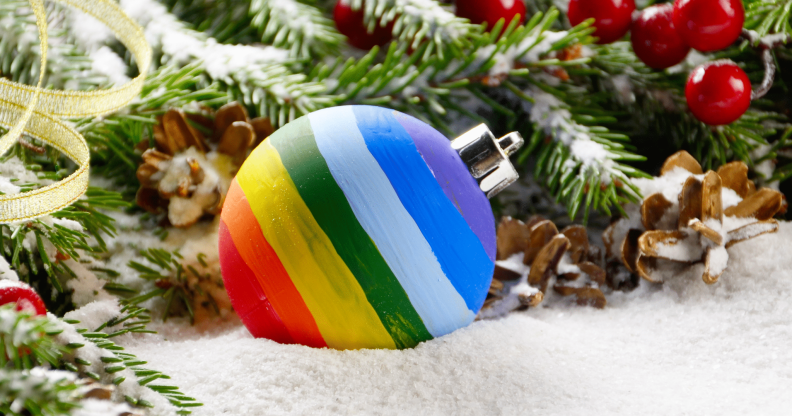Experts share simple advice and strategies for queer folk coping with eating disorders at Christmas

Christmas can be difficult for LGBT+ people for a variety of unique reasons. (Envato)
A queer therapist and an eating disorder expert share their advice for queer people coping with disordered eating this Christmas.
As a group, queer people are more likely to experience an eating disorder than their straight and cis counterparts. One in eight respondents to a 2018 Stonewall survey reported having an eating disorder, while a survey conducted by Beat, the UK’s eating disorder charity, found that 37 per cent of all lesbian, gay and bisexual respondents wouldn’t feel comfortable looking for help.
Tom Quinn, director of external affairs at Beat, says the festive season can be a “particularly challenging time for those with eating disorders”.
“The holidays tend to revolve around socialising with others and an expectation to eat more than usual, which can cause increased anxiety and stress for people experiencing disordered eating behaviours such as binging or restricting,” Tom explains.
The research is clear that queer people are “disproportionately” are at higher risk of developing an eating disorder, which can make Christmas something of a minefield.
For some, it means they’ll be reconnecting with families who might be a source of “rejection, stigma and shame” – issues that may have compounded their eating disorders to begin with. That’s according to Chris Grant, founder of The Queer Therapist – an affirming and accredited online therapeutic practice based in Glasgow that works specifically with LGBT+ people.
“We’re upping the triggers, we’re upping the stressors, which means we’re more likely to default to these older, maladaptive coping strategies,” they explain.
“We’ve got increased stressors – around Christmas time, there’s going to be a focus on food, there’s going to be a focus on portions, you might even have families commenting on appearance – particularly through a gender diverse lens, that particular aspect of it might be very problematic both from a gender dysphoria perspective but also from an eating disorder perspective as well. In conversations about appearance, a lot of gendered language might be used.” It’s also common for families to put pressure on people to eat.
Chris continues: “A lot of people have plenty of excellent coping strategies they will have used for managing moments on a day-to-day basis, but then you put them into a new environment and they can be thrown off kilter.”
It’s vital to try to retain these strategies as much as possible, they say, and to put in place other mitigating measures to protect their mental health and wellbeing throughout the festive season.
Change the subject when the topic turns to food at the dinner table
Chris advises: “If conversation turns to food – things about portion, weight – it can be really helpful to try and change the subject.
“It can also be really useful ahead of the day to resource yourself as best as possible to actually disclose some of these things, if you haven’t already done so. Talk about these things with family members so they know not to comment on ritualistic behaviours around food, or they’ll know not to talk about appearance or portion sizes.
“The family can also be a big resource if there’s a level of comfort there to be able to disclose these things.”
Beat’s Tom Quinn agrees: “If you have a trusted loved one who you could talk to ahead of the day, you could discuss plans and put coping mechanisms into place. For instance, coming up with a subtle signal to show that you are struggling, or making sure to have non-food related activities such as watching films, going for short walks or playing board games”
Tom continues: “For those who do not feel comfortable opening up to family members, we’d recommend finding times in the day to recharge and rest away from the dinner table, and to reach out for support if you need it. Beat’s helpline will be open from 4pm to midnight from 24 December to 1 January to help anybody in need throughout Christmas.”
Chris also suggests that people try to distract themselves from intrusive thoughts. “Ideally what we’re trying to create is an environment that would be similar to the person’s home environment, not the family home environment, so a place that feels safe and normalised,” they explain.
“So again, it’s thinking about what is going to support you in that space to feel as much yourself as possible. For some people, that could be just music on in the background. For other people, they may have a coping strategy in place where they have an activity planned for after the meal, so it immediately focuses their attention on something else instead of going into the rumination and worry that would follow the actual eating itself.”
Finally, Chris says queer people with eating disorders should lean on their allies as much as they possibly can over the festive period – and make sure they have access to affirming spaces.
“Even if you’re not able to get out and meet up with people face to face, there are loads of online resources and platforms where you can remind yourself that you are accepted, you are valid, and there are spaces that will affirm you,” Chris says.
“Essentially what we’re trying to do here is to mitigate the tipping point that can happen with families when we’re around them for long periods of time. A lot of these old, difficult, maladaptive coping strategies can come into place and the shame gets triggered within us.”
Beat promotes awareness and understanding of eating disorders, also challenging inaccurate stereotypes and stigma. Find out more at Beat’s website or by calling 0345 634 1414.


